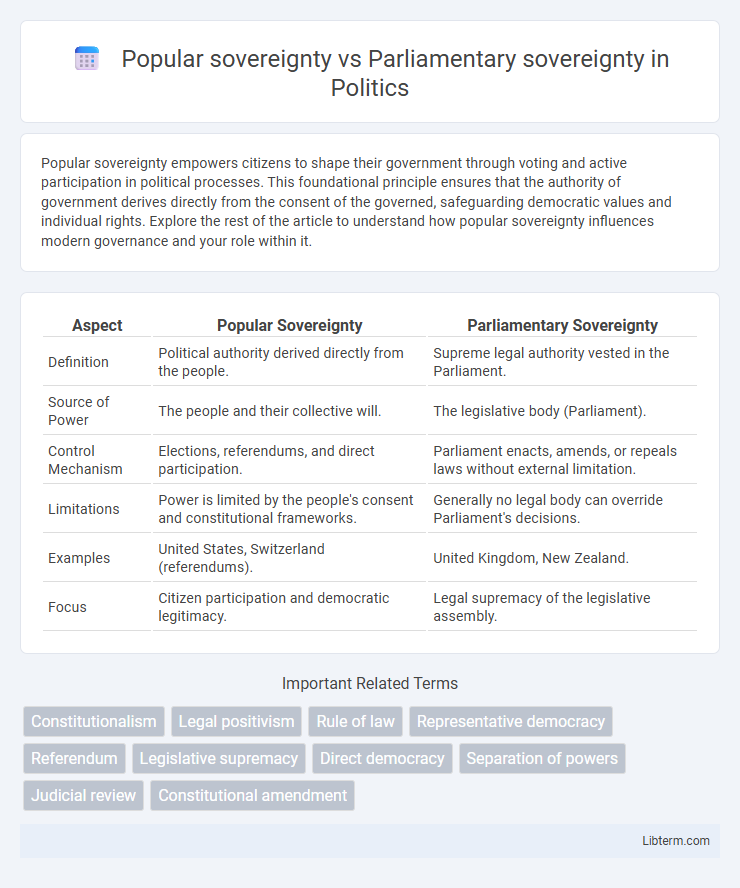Popular sovereignty empowers citizens to shape their government through voting and active participation in political processes. This foundational principle ensures that the authority of government derives directly from the consent of the governed, safeguarding democratic values and individual rights. Explore the rest of the article to understand how popular sovereignty influences modern governance and your role within it.
Table of Comparison
| Aspect | Popular Sovereignty | Parliamentary Sovereignty |
|---|---|---|
| Definition | Political authority derived directly from the people. | Supreme legal authority vested in the Parliament. |
| Source of Power | The people and their collective will. | The legislative body (Parliament). |
| Control Mechanism | Elections, referendums, and direct participation. | Parliament enacts, amends, or repeals laws without external limitation. |
| Limitations | Power is limited by the people's consent and constitutional frameworks. | Generally no legal body can override Parliament's decisions. |
| Examples | United States, Switzerland (referendums). | United Kingdom, New Zealand. |
| Focus | Citizen participation and democratic legitimacy. | Legal supremacy of the legislative assembly. |
Introduction to Sovereignty Concepts
Popular sovereignty asserts that the authority of a state and its government derive from the consent of the governed, emphasizing the power of the people as the ultimate source of legitimacy. Parliamentary sovereignty, primarily rooted in the UK constitutional framework, holds that the legislative body is supreme and can make or unmake any law without legal limitation. Understanding these sovereignty concepts is crucial for analyzing the balance of power, democratic governance, and constitutional supremacy within different political systems.
Defining Popular Sovereignty
Popular sovereignty is the principle that the authority of a government is created and sustained by the consent of its people, typically expressed through elected representatives. This concept emphasizes that ultimate political power rests with the citizens, who have the right to shape laws and policies directly or indirectly. Popular sovereignty contrasts with parliamentary sovereignty, where the legislative body holds supreme power, often without direct constraints from the electorate.
Understanding Parliamentary Sovereignty
Parliamentary sovereignty is a foundational principle in UK constitutional law, asserting that Parliament has the supreme legal authority to create or end any law, and no other body can override or set aside its legislation. Unlike popular sovereignty, which centers on the power of the people as the ultimate source of political authority, parliamentary sovereignty places that power in the hands of the elected legislative body. This principle ensures that Parliament's decisions are final, reflecting the legal framework that underpins the UK's uncodified constitution.
Historical Development of Both Doctrines
Popular sovereignty emerged from Enlightenment thinkers like Rousseau and Locke, emphasizing the people's authority to govern and legitimizing political power through consent. Parliamentary sovereignty developed in England, particularly after the Glorious Revolution of 1688, establishing Parliament as the supreme legal authority capable of creating or ending any law without external interference. These doctrines reflect contrasting foundations of sovereignty: one rooted in the collective will of citizens, the other in legislative supremacy within constitutional monarchy evolution.
Core Principles: People versus Parliament
Popular sovereignty centers on the principle that ultimate authority rests with the people, emphasizing direct participation and consent in governance decisions. Parliamentary sovereignty asserts that the legislative body holds supreme legal authority, capable of enacting or repealing any law without external interference. The core tension lies in whether legitimacy derives from the collective will of the citizenry or the institutional supremacy of the parliament.
Implementation in Different Political Systems
Popular sovereignty is primarily implemented through democratic mechanisms such as elections, referendums, and constitutional frameworks that emphasize citizens' power to shape government authority, as seen in countries like the United States and Switzerland. Parliamentary sovereignty is characteristic of systems like the United Kingdom, where the legislative body holds supreme authority, and its laws cannot be overridden by any other institution, reflecting a centralized legislative supremacy. In mixed or hybrid political systems, such as Canada or New Zealand, elements of popular sovereignty coexist with parliamentary sovereignty, balancing citizen participation with parliamentary law-making dominance.
Case Studies: Countries Practicing Each Sovereignty
In countries practicing popular sovereignty, such as the United States and Switzerland, constitutional frameworks prioritize the authority of the people through mechanisms like referendums and direct elections. Parliamentary sovereignty, exemplified by the United Kingdom and New Zealand, grants the legislature supreme legal authority, with courts unable to overrule parliamentary statutes. These case studies highlight fundamental differences in the balance of power, where popular sovereignty centers on citizen consent, while parliamentary sovereignty emphasizes legislative supremacy within constitutional order.
Advantages and Criticisms of Popular Sovereignty
Popular sovereignty empowers citizens to directly influence governance, ensuring policies reflect the people's will and enhancing democratic legitimacy. It promotes political participation and accountability but may lead to decision-making challenges in diverse societies due to majority rule potentially marginalizing minority rights. Critics argue that popular sovereignty risks populism and instability when complex policy issues are oversimplified in public debates.
Benefits and Drawbacks of Parliamentary Sovereignty
Parliamentary sovereignty grants the legislature supreme legal authority, enabling swift decision-making and adaptability in creating or repealing laws, which enhances democratic responsiveness. However, this concentration of power risks potential abuses or authoritarianism if checks and balances are insufficient, possibly undermining individual rights and minority protections. The lack of judicial review under parliamentary sovereignty limits the judiciary's role in restraining legislative overreach, which can challenge constitutional stability.
Contemporary Relevance and Future Trends
Popular sovereignty asserts that ultimate political authority resides with the people, shaping democratic legitimacy and citizen participation in governance, whereas parliamentary sovereignty grants supreme legal authority to the legislature, often limiting judicial review. Contemporary relevance highlights rising demands for direct democracy mechanisms, such as referendums, challenging traditional parliamentary supremacy in countries like the UK and Canada. Future trends suggest increasing tensions between popular mandates and parliamentary powers, fueled by digital activism and global governance pressures, necessitating legal adaptations to balance democratic inclusion with institutional stability.
Popular sovereignty Infographic

 libterm.com
libterm.com